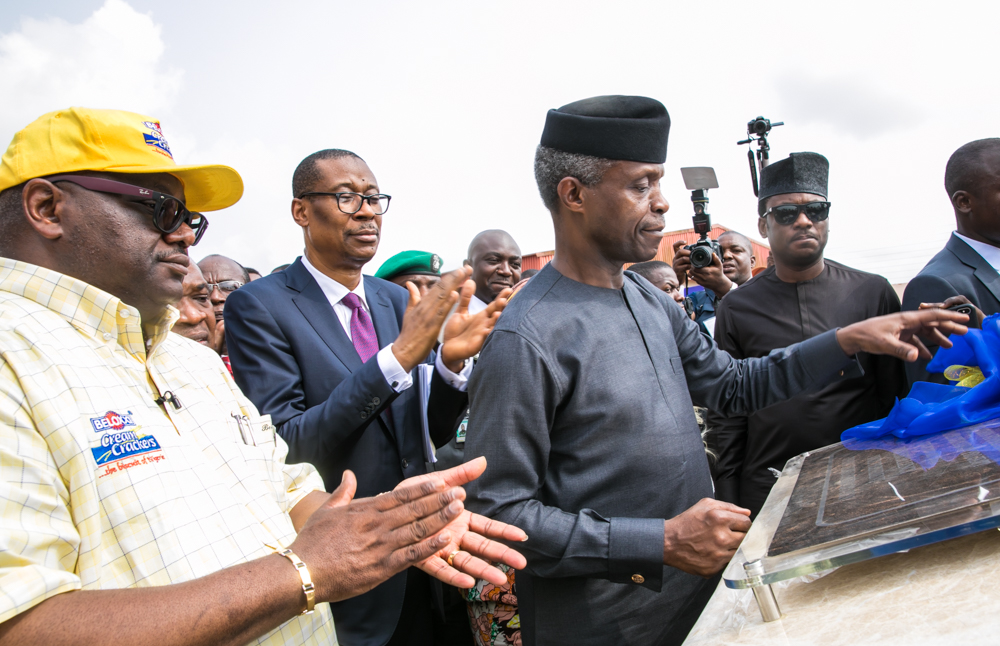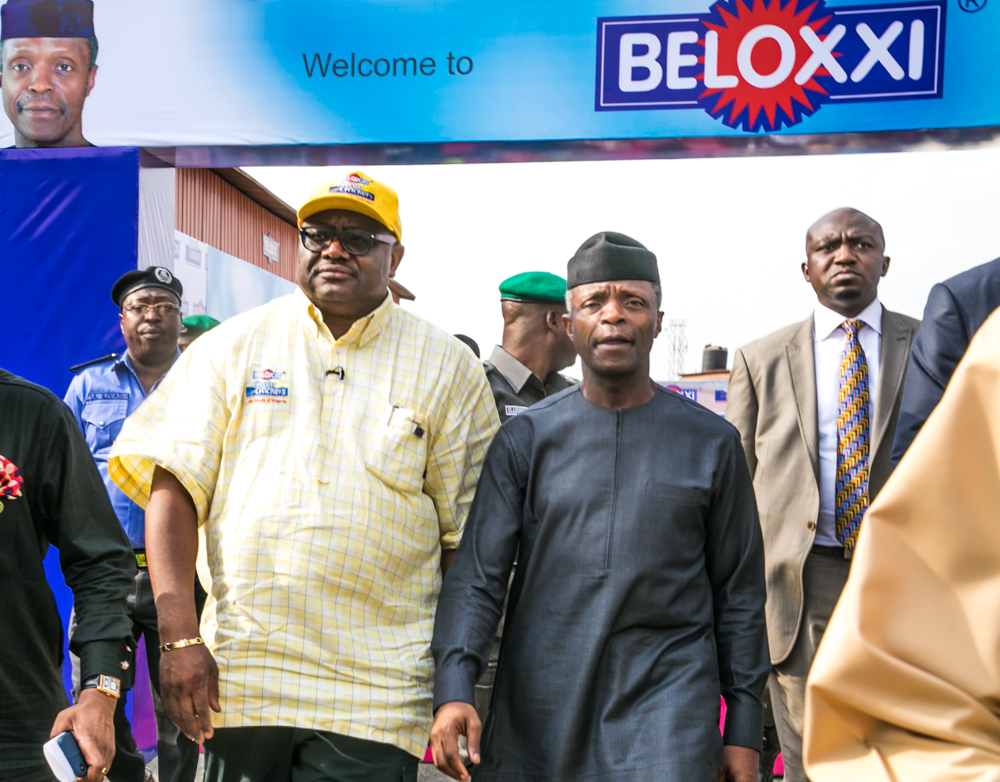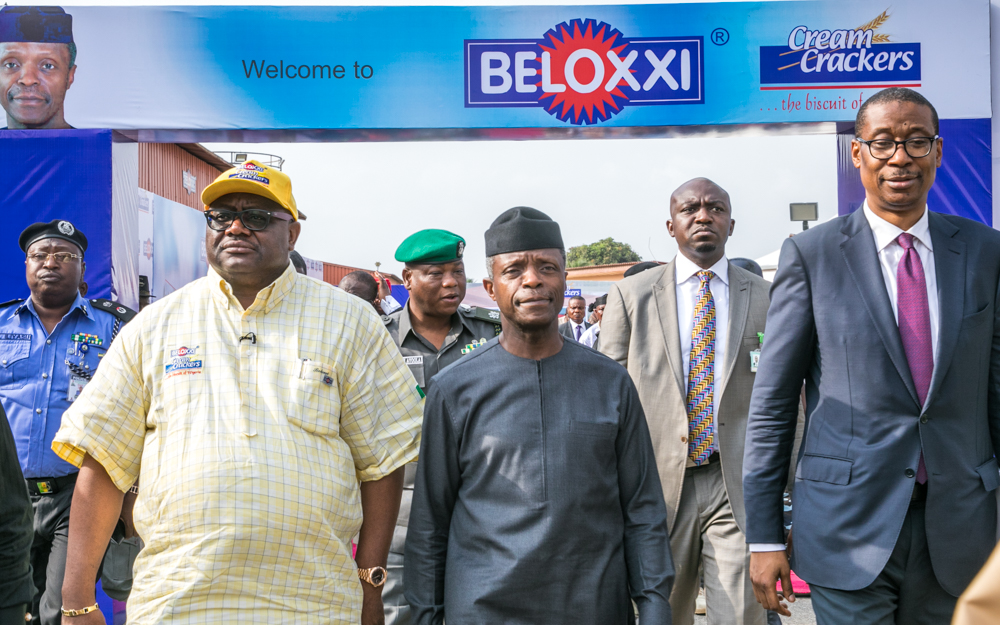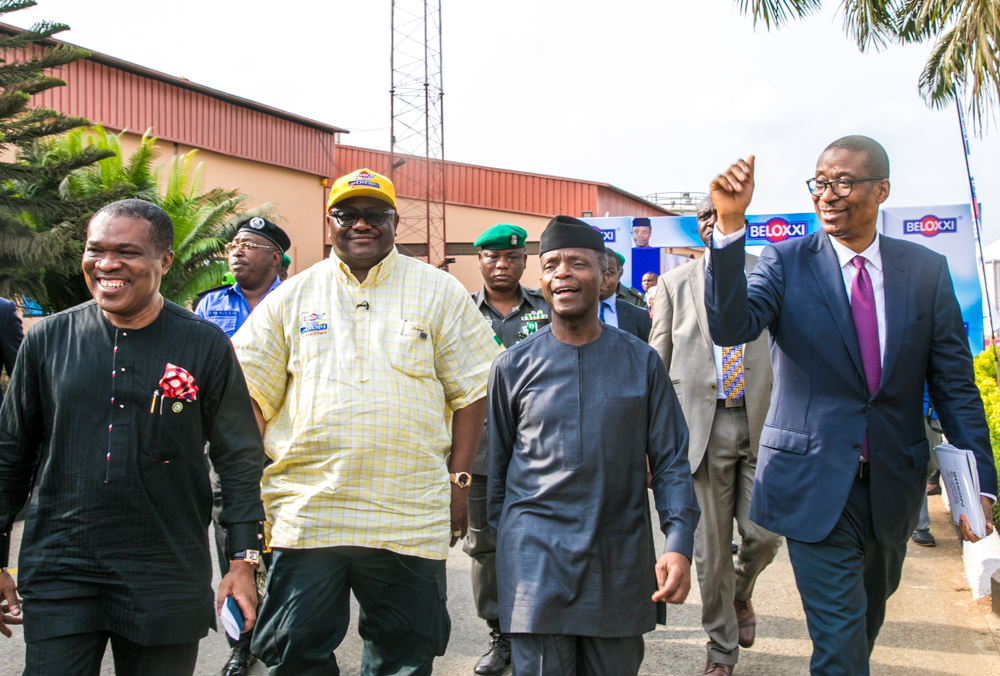Commissioning Of The 6th Production Line And Foundation Stone-Laying Ceremony For The 3rd Phases Expansion Project Of Beloxxi Industries Limited
BUHARI ADMINISTRATION COMMITTED TO PROVIDING INFRASTRUCTURE TO BOOST LOCAL MANUFACTURING – VP OSINBAJO
*Says economic plan has put the country on a steady path of sustainable economic growth and global competitiveness
“One important component of the Plan is the provision of critical infrastructure, which we recognise as both hard infrastructure, such as roads, rail and power, as well as soft infrastructure, in terms of creating an enabling business environment and making Nigeria a progressively easier place in which to do business.”
“I must say categorically, that the Buhari administration is fully committed to providing both forms of infrastructure in order to support companies such as Beloxxi as we spur growth and create jobs within the economy.” – Vice President
ADDRESS BY HIS EXCELLENCY, PROF. YEMI OSINBAJO, SAN, GCON, VICE PRESIDENT, FEDERAL REPUBLIC OF NIGERIA, AT THE COMMISSIONING OF THE 6TH PRODUCTION LINE AND FOUNDATION STONE-LAYING CEREMONY FOR THE 3RD PHASE EXPANSION PROJECT OF BELOXXI INDUSTRIES LIMITED, AGBARA, OGUN STATE, NIGERIA, ON THURSDAY, 08 FEBRUARY, 2018.
Protocols
It is my pleasure to be here today on the occasion of the formal commissioning of Beloxxi Industries’ 6th Production Line and the laying of the foundation stone for its 3rd phase expansion project.
I am told that this project would increase the company’s production capacity from 30 million cartons of biscuits per year to 50 million and that it would grow its local workforce from 3,729 to about 6,000 direct staff. This is truly worth commending when you consider the socio-economic benefits of this expansion as well as the unique nature of its employment policies. Obi has just told us about their deliberate policy of employing young people instead of using robots or too many labour saving equipment.
Indeed, this approach to structuring your business is exemplary. The opportunity we have as businesses and industrial elite comes with a responsibility; the obligation to offer an opportunity to others especially Nigeria’s very driven and enthusiastic young people. This is the attitude to Nigerian development that will make a difference. As I have been told that the Beloxxi slogan is: “the biscuit of Nigeria.”
Over the past 12 months, about $66 billion worth of investments have been announced across the country and our stock market is one of the highest performing indices in the world.
So there is a strong investor attraction to Nigeria and we are working relentlessly to sustain it, by implementing the Economic Recovery and Growth Plan (ERGP) to set us on the steady path of sustainable economic growth and global competitiveness.
One important component of the Plan is the provision of critical infrastructure, which we recognise as both hard infrastructure, such as roads, rail and power, as well as soft infrastructure, in terms of creating an enabling business environment and making Nigeria a progressively easier place in which to do business.
I must say categorically, that the Buhari administration is fully committed to providing both forms of infrastructure in order to support companies such as Beloxxi as we spur growth and create jobs within the economy.
As far back as July 2016, Mr President inaugurated a Presidential Enabling Business Environment Council (PEBEC), which he asked me to Chair, and gave us a mandate of removing critical bottlenecks in doing business in the country and moving 20 places up in the World Bank Ease of Doing Business Index.
Many of you will recall that in October 2017, the World Bank released its flagship “Doing Business” report for 2018. In that report, Nigeria moved up by an unprecedented 24 places to 145th from 169th, and for the first time, the country was recognized as one of the top 10 most improved economies in the world.
This result shows the power of collaboration across various levels of government, and drawing on global best practices to design an approach that is working for the country in terms of clear and committed leadership at the highest political levels and multi-faceted reforms coordinated centrally by a small dedicated team of “Reform Leaders” who drive the reform agenda, monitor the outcomes and report the progress.
As I explained at a similar event earlier today: PEBEC announced a third 60-day National Action Plan (NAP 3.0), which commenced on February 5 and will run till April 5, 2018. This accelerated intervention programme will focus on implementing some of the most relevant ease of doing business reforms that have come on our radar within the next two months.
For example, we are working with NAFDAC, SON, the Nigeria Customs Service, as well as the Police Force, among others; to ease the burden of product registrations, quality standards regulation, as well as the movement of goods and services across the country.
Since July 2017, the Council also began collaborating with State Governments to implement ease of doing business initiatives that will make States increasingly attractive investment hubs.
This year, we are working on a number of key reform initiatives, including the deployment of a National Trading Platform comprising a Single Window Platform, deployment of scanners and a Ports Community system that will together promote transparency and efficiency at our ports. Last Monday, February 5th, Mr, President signed Executive Order 005, a decisive step in the promotion of indigenous businesses, talent and professionals, especially in Science, Engineering and Technology. The order mandates all procuring authorities to give priority to Nigerian companies and firms in the award of contracts.
The Order also directs all MDAs to engage Nigerian professionals in the planning, design and execution of National Security projects. The order also specifically prohibits the Ministry of the interior from granting work permits to foreign workers whose skills are readily available in Nigeria. Where expertise is lacking, Procuring entities are required to give preference to foreign companies and firms with a demonstrable and verifiable plan for indigenous development, prior to the award of such contracts.
Furthermore, we are once again collaborating with the National Assembly and supporting the passage of their priority business climate reform bills, while partnering to deliver an Omnibus Bill, which will address the various irritants within extant laws that need to be amended for the purpose of achieving an enabling business environment.
From a broader perspective, just two days ago, we launched a Policy Lab intervention to accelerate the implementation of the Economic Recovery and Growth Plan (ERGP). The Labs will bring together all private sector stakeholders and public sector officials necessary to achieve the specific policy or project objectives of the ERGP. In the first instance, we will focus on three Labs in the areas of 1) agriculture and transport; 2) power and gas supply and 3) manufacturing and processing.
The goal of these labs is to generate $24 billion worth of investment, 80% of which is expected from the private sector, with 15 million jobs, projecting 3.5% GDP growth this year and 7% by 2020.
So we look forward to collaborating with Beloxxi Industries, across these platforms, to achieve our national objectives of economic growth and job creation.
On this note, I would like to congratulate the Founder and CEO of Beloxxi Industries Limited – Mr Obi Ezeude, as well as other members of the Board and management of Beloxxi Industries on this commissioning and foundation-laying ceremony.
It is a laudable achievement by a Nigerian company and a significant step for the local manufacturing sector and the economy as a whole.
I, therefore, urge other indigenous manufacturers and businesses not to give up on Nigeria’s future but to keep on investing and pushing the frontiers of what a local business can do – as the country becomes an increasingly easier place in which to do business.
Once again, congratulations to you all and thank you for your attention.
One important component of the Plan is the provision of critical infrastructure, which we recognise as both hard infrastructure, such as roads, rail and power, as well as soft infrastructure, in terms of creating an enabling business environment and making Nigeria a progressively easier place in which to do business.





